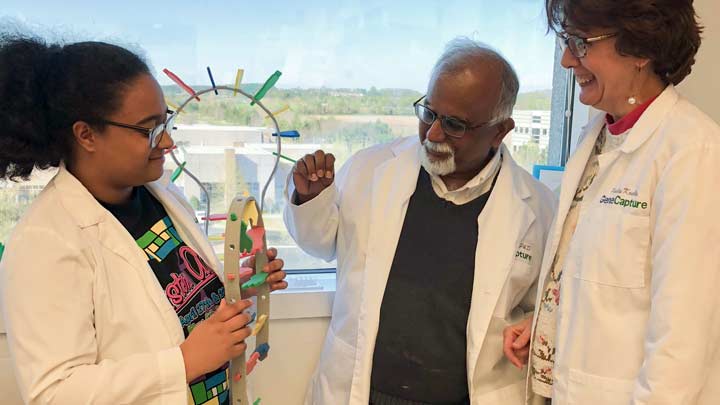
GeneCapture’s prototype of the test cartridge will screen for hundreds of pathogens in about 45 minutes.
GeneCapture Inc.
Biotechnology startup GeneCapture Inc. has successfully demonstrated a completely new process for rapidly determining the genetic signature of a pathogen. The disposable test cartridge is about the size of a smartphone and can analyze a human or animal sample to detect the presence of a broad range of specific bacteria, viruses, or fungi in less than an hour. Signature probes for newly discovered or mutated pathogens can be also added to the cartridge in just a few days.
"Our team has combined several cutting-edge technologies into an innovative solution for a very critical problem we face today – the diagnostic delay in identifying the source of an infection," says Peggy Sammon, CEO and cofounder. "During that one-to-three-day turnaround, contagion spreads and the microbes mutate, making conditions for epidemics and antibiotic resistance highly concerning. We want the patient to get a diagnosis within an hour and get on the right medicine right away."
GeneCapture is the brainchild of Dr. Krishnan Chittur, a professor emeritus in the Department of Chemical and Materials Engineering at The University of Alabama in Huntsville (UAH), as well as UAH biology professor Dr. Joseph Ng, UAH adjunct professor Dr. Mark Pusey, and Jeff Dowell, who at the time was a student in UAH’s graduate program in Biotechnology Science and Engineering. It was after enduring an agonizing wait to see if his premature baby had pneumonia that Dr. Chittur began working on a process for rapid-infection diagnosis.

Chittur and Koelle explain the biochemical process to a student intern.
GeneCapture Inc.
"It turns out she did not have an infection, but we didn’t learn that until after three days of strong antibiotics had coursed through her tiny body," he says. "A few years later, in my lab at UAH, we worked out a fast way to see if an infection was present right away. We knew it was a game-changer." Soon after, he partnered with entrepreneur Sammon, and together they formed the company, licensed the patent, and secured funding from a variety of sources. "We received funding through Alabama Launchpad and a group of visionary angel investors," says Sammon. "And we have benefited from the help of several local clinics and the collaborative entrepreneurial environment in Huntsville."
To turn the idea into a product, they assembled a team in their office and lab space on the campus of the HudsonAlpha Institute for Biotechnology; today, that team includes UAH alumni Zac McGee and Ethan Stallings, while UAH professors Dr. Louise O’Keefe and Dr. Ng serve as board advisors; UAH physics professor Dr. Don Gregory also provided optical analysis. "From the start, we knew we wanted a simple, rugged, inexpensive product that could be used in remote applications," says Paula Koelle, a Harvard-educated biochemist and GeneCapture’s vice president of program management. With her help, they were able to reduce the original process, which took several hours, down to just 45 minutes. "Our initial work with patient samples shows that the technology is living up to its potential"
The process depends on hundreds of unique genetic probes arranged on a microarray that capture the genetic material of a pathogen if it is present. An optical scan identifies which probes have been activated and then matches the results to a broad selection of pathogens, resulting in a rapid onsite or wirelessly reported diagnosis. "Our goal is to keep the entire test cost under $20," says Koelle, "and we are on a good path to accomplishing that."
The company is now developing a pre-manufacturing model for clinical studies and submittal to the U.S. Food and Drug Administration for an expected 510(k) clearance. "Breaking the one-hour barrier, the $20 barrier, and the portability barrier makes this a great market-creation opportunity," says Sammon. "We want to get this product in use at doctor’s offices, nursing homes, clinics, field hospitals, airports, and cruise ships – all the places that can react quickly to infectious outbreaks."